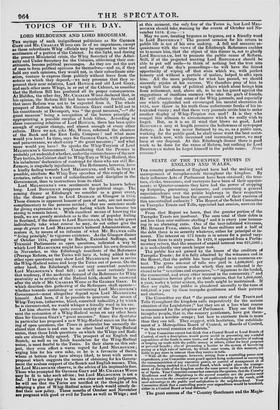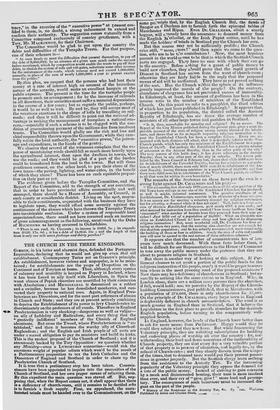STATE OF THE TURNPIKE TRUSTS IN ENGLAND AND WALES.
THE country gentlemen of England have had the making and management of turnpike-roads throughout the kingdom. By their influence Acts of Parliament have been obtained; the trustees, clerks, treasurers, and surveyors have been of their appointment; at Quarter-sessions they have had the power of stopping up footpaths, preventing nuisances, and exercising a general superintendence over the public highways in their respective counties. What has been the general result of their exercise of this uncontrolled authority ? The Report of the Select Committee on Turnpike Trusts and Tolls, appointed last session, answers the question.
From that Report we learn, that the greater portion of the Turnpike Trusts are insolvent. The sum total of their debts is not less than nine millions sterling! and it is every year increasing in an alarming ratio. One of the best-informed witnesses, Mr. ROBERT FUGE, states, that for three millions and a half of the debt there is no security whatever, either for principal or interest. The interest on 173 trusts is in arrear for a period varying from three to sixty years. In 1829, it appeared from a Parliamentary return, that the amount of unpaid interest was 821,5861.; it is undoubtedly very much larger now. The public has not gained by the losses of the creditors of Turnpike Trusts ; for it is fully admitted by the witnesses and in the Report, that the public has been pillaged to an enormous extent. The gross amount of tolls now paid is 1,600,000/ per annum ; and the system under which they are collected is declared tote "vexatious and expensive,"—" injurious to the landed, the commercial, and every other interest in the community ;" and the Committee further give it as their opinion, that for 1,00,000/. a year, under a better system, the roads might be maintained. If they arc right, the public is plundered annually to the tune of 600,0601. a year by these turnpike gentlemen and their patrons and abettors.
The Committee say that "the present state of the Trusts and Tolls throughout the kingdom calls imperatively for the serious attention of the Legislature ;" but they are at a loss what course to recommend for the adoption of Parliament. They see that the turnpike people, that is, the country gentlemen, have got them-, selves into a terrible scrape ; but how to extricate them is more than they can tell. They suggest, with hesitation, the establishment of a Metropolitan Board of Control, or Boards of Control, "in the several counties or districts."
"Your Committee cannot but think that a Central Board or Local Boards of Control, of such a description, would piove useful in preventing any wasteful expenditure of the funds in some trusts, and in checking the practice of making or keeping up roads with the public money in others, either for local purposes or personal benefit ; also of presenting a barrier to the system of borrowing money at a high rate of interest, by which some trusts, at this moment, are liable to pay more in interest than they receive in tolls.
"With all the advantages, however, arising from a controlling power over expenditure, your Committee must guard against being understood as conveying the recommendation of any executive power, or control of management or of direction, being confided to a Central Board, which might place the management of the roads of the kingdom under the same power as the roads of France or of Spain. Your Committee cannot but entertain the opinion, that the Country Gentlemen and the Magistracy in the several counties are the parties most likely to exercise the executive power in all matters relating to the roads, with most advantage to the public and satisfaction to the neighbourhood. Your Committee think that a controlling power over expenditure would be beneficial, either in a Central Board or local districts."
The great success of the "Country Gentlemen and the Magis
tram" in the exercise of the" executive power" at present confided to them, is, no doubt, a strong inducement to extend and confirm their authority. The suggestion comes mmturally from a Committee composed exclusively of country gentlemen, with a Tory, Mr. MACRINNON, for their Chairman. The Committee would be glad to put upon the country time debts and difficulties of the Turnpike Trusts. For that purpose, one of their schemes is " At once firmly to meet the difficulties that present themselves, to pay off the debt of 9,000,0001. by an advance of a given sum much under the amount
before-mentioned, which by composition would enable the trusts to pay off their debts, to abolish the system of tolls and toll-gates, substitute some other revenue for the maintenance Of the roads, which revenue need not exceed 1,000,000/. annually, in place of the sum of nearly 1,600,000/. a year at present exacted from the public."
By.this plan, we suspect that the persons who had lent their money at a rate of interest high on account of the hazardous nature of the security, would make an excellent bargain at the public expense. The present is the time for the turnpike people to promote such an arrangement ; for by the increase of railroads in all directions, their securities must suffer a material depreciation in the course of a few years ; but as regards the public, perhaps, it would be as well to wait. By and by, they will escape most of the vexations exactions in the shape of tolls by travelling on railroads; and then it will be difficult to point out the national advantage in making the management of turnpikes a national concern,—especially if such a scheme is to be clogged with the condition of guaranteeing payment of the millions due from insolvent trusts. The Committee would gladly see the risk and loss and chief responsibility thrown upon the Government; while they carefully retain the local authority, the "executive power," the patronage and expenditure, in the hands of the gentry. We observe that several of the witnesses complain that the expense of maintaining roads should fall so much more heavily upon the agricultural interest, than upon the dwellers in towns, who use the roads ; and they would be glad if a part of the burden could be transferred from the land to the towns. But will these gentlemen consent, on the other hand, to pay their share of the town taxes—the paving, lighting, and water-rates, in the benefit of which they share? There has been no such equitable proposition on their part as yet. The evidence given before the Turnpike Committee, and the Report of the Committee, add to the strength of our conviction, that in order to have provincial affairs economically and well managed, there should be a House of Assembly, or Council, in each county or considerable district. Living on the spot, responsible to their constituents, acquainted with the business they have to legislate upon, they would afford some security against the continuance of the abuses which have thrown the Turnpike Trusts into inextricable confusion. Under a system of responsible local superintendence, there could not have occurred such an instance of gross mismanagement as the following, mentioned by the Duke of RICHMOND as having occurred in Oxfordshire.
"There is one road, St. Clements ; its income is 1820/. 7s. ; its expenditure 2023/. 17s. 8d.; it has a debt of 15,8641. I53. ; and the length of that trust is only one mile seven furlongs and thirty perches l "



























 Previous page
Previous page